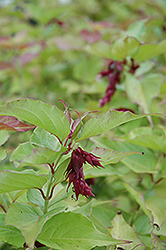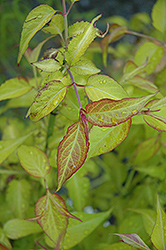It's all about ...
plants

Golden Lanterns Pheasant Berry
Leycesteria formosa 'Golden Lanterns'
Height: 5 feet
Spread: 5 feet
Sunlight:
![]()
![]()
Hardiness Zone: (annual)
Other Names: Himalayan Honeysuckle
Description:
A striking addition to border or container plantings; emerging red foliage becomes bright yellow as it matures; pendulous white flowers with reddish bracts are followed by red berries that turn deep purple in fall adding to the display of color
Ornamental Features
Golden Lanterns Pheasant Berry features showy racemes of white tubular flowers with shell pink overtones and ruby-red bracts hanging below the branches in mid summer, which emerge from distinctive red flower buds. Its attractive pointy leaves emerge red in spring, turning chartreuse in colour throughout the season. It features an abundance of magnificent deep purple berries from early to late fall. The burgundy stems can be quite attractive.
Landscape Attributes
Golden Lanterns Pheasant Berry is a multi-stemmed annual with a mounded form. Its medium texture blends into the garden, but can always be balanced by a couple of finer or coarser plants for an effective composition.
This plant will require occasional maintenance and upkeep, and is best pruned in late winter once the threat of extreme cold has passed. It is a good choice for attracting birds and hummingbirds to your yard, but is not particularly attractive to deer who tend to leave it alone in favor of tastier treats. Gardeners should be aware of the following characteristic(s) that may warrant special consideration;
- Spreading
Golden Lanterns Pheasant Berry is recommended for the following landscape applications;
- Accent
- Mass Planting
- General Garden Use
- Groundcover
Planting & Growing
Golden Lanterns Pheasant Berry will grow to be about 5 feet tall at maturity, with a spread of 5 feet. Although it's not a true annual, this plant can be expected to behave as an annual in our climate if left outdoors over the winter, usually needing replacement the following year. As such, gardeners should take into consideration that it will perform differently than it would in its native habitat.
This plant does best in full sun to partial shade. It is quite adaptable, prefering to grow in average to wet conditions, and will even tolerate some standing water. It is not particular as to soil type or pH. It is somewhat tolerant of urban pollution. This is a selected variety of a species not originally from North America.

